Man’s Best Friend
BU community shares stories about dogs, cats, other beloved critters
Americans have long had a love affair with animals, and it’s getting serious. According to the Humane Society, pet ownership in the United States has tripled since the 1970s. In 2012, 62 percent of all American households had at least one pet. That translates to an estimated 95.6 million cats, 83.3 million dogs, 20.6 million birds, 18.1 million small animals, 13.6 million saltwater fish, 11.6 million reptiles, and 8.3 million horses.
And how we love to spoil our pets. In 2013, Americans spent a record $55.7 billion on these nonhuman family members, according to the American Pet Products Association. Of that, $21.5 billion was shelled out by pet owners on food alone.
When we asked the BU community to send us stories about their pets, we heard from a lot of dog lovers and cat lovers. But we also heard from folks with pet birds, snakes—even hedgehogs. Each story is unique, but what binds them together is the love between human and animal.

Katie Tomsho (SPH’16) adopted her two-year-old cat, Jitterbug, a year ago. It wasn’t love at first sight for Jitterbug, who was a bit wary of Tomsho at first. But the two have not only warmed to each other, but provided mutual comfort. “It’s corny, but she’s special to me because I feel like I helped her find an environment where she can relax, and she’s helped me overcome a bout with anxiety,” Tomsho says.

Jack, a venerable 16-year-old shih tzu, loves to go for rides in his stroller with his owners Lisa Brown, Medical Campus associate director of communications, and her husband, Arlon Brown (SMG’74). Here, they’re running errands at a local Lowes. “Jack came to us blind, without teeth, but happy,” says Lisa, who adopted him from a shelter when he was five. “He doesn’t think of himself as a dog. He thinks of himself as a four-legged person, who prefers to eat people food and sleep in people beds. He’s a trouper.”
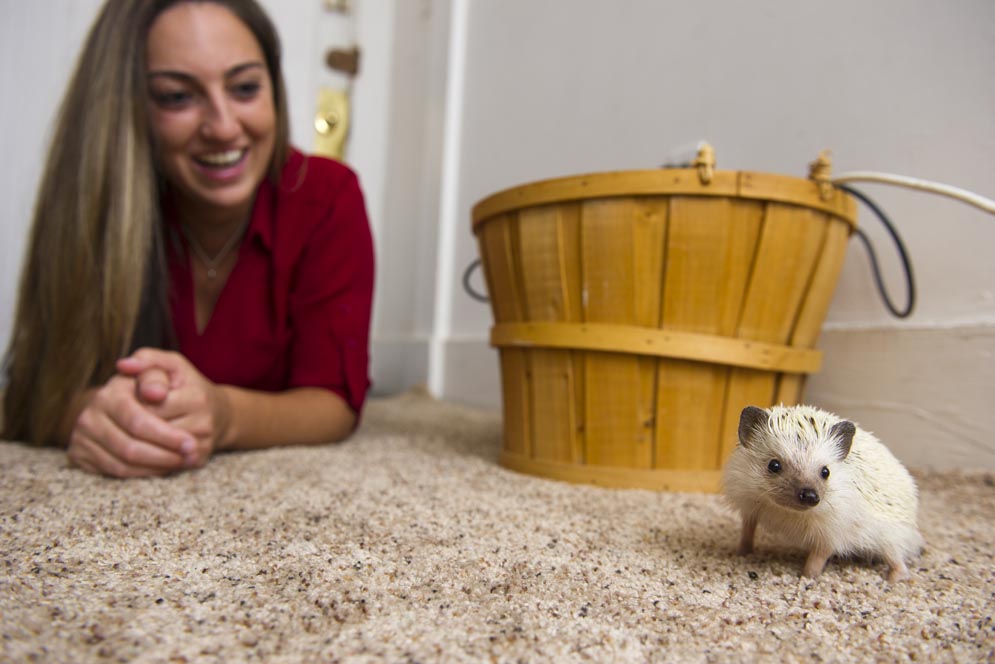
Alyssa Williamson (SAR’16) adopted her hedgehog, Hunter, a few years ago when a friend could no longer care for him. “I’m so happy I decided to take him,” Williamson says. Despite his quills, Hunter is quite cuddly and will often curl up in a ball near Williamson while she studies. Nocturnal, he spends his nights running on a wheel, and by day can be found burrowed up and sleeping in his fleece-filled cage.
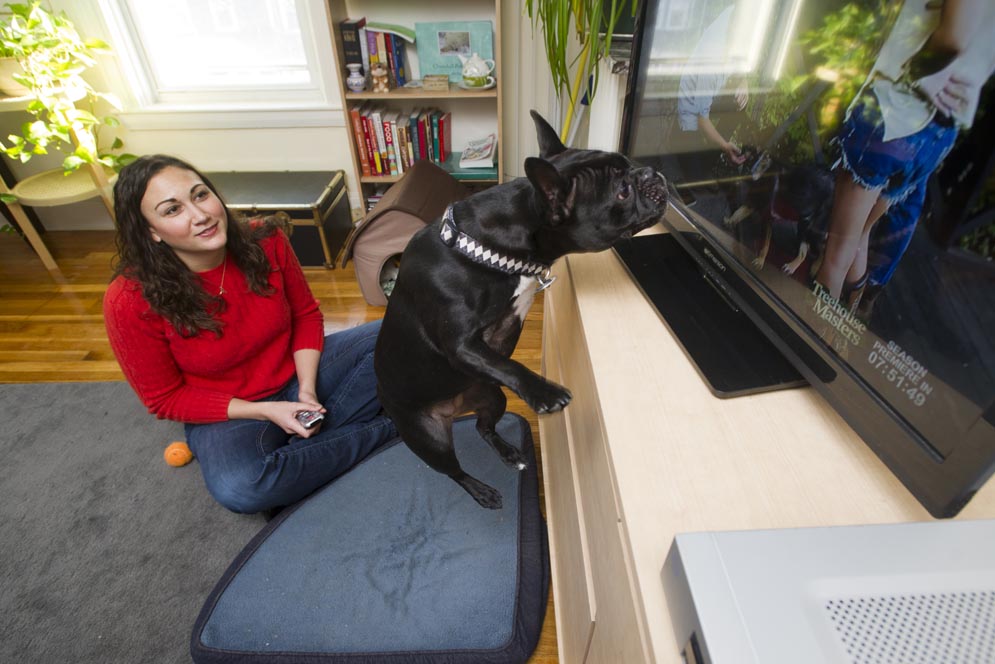
Maureen Mayer (CAS’03, MET’10), a senior budget analyst in the Budget Office, frequently watches television with her three-year-old French bulldog–Boston terrier mix, Lola. Here, Lola is going bonkers over the sight of a dog during an episode of an Animal Planet show. “I now know what commercials have animals in them and will change the channel to avoid Lola’s reaction,” says Mayer. “Obviously watching Animal Planet is out of the question.”

Rika Katz, a senior program assistant at the Elie Wiesel Center for Judaic Studies, inherited her son’s snake, Kaala, when taking care of her got to be too much for him. “Kaala is friendly by nature and very used to being handled,” Katz says, and “she likes to curl up around my arm for warmth.” Since acquiring Kaala, she’s developed a new respect for snakes, Katz says: “They have beautiful markings and graceful movement, and are easy pets to look after. They don’t bark or smell, and as they don’t need walking and only eat once a week or so, it’s easy to go away and not worry about them. They may not love you like a cat or dog, but in my opinion they are way better than a goldfish.”

Virginia Sapiro, dean of Arts & Sciences, poses here with her 10-year-old border collie, Panda, who accompanies her to her office nearly every day. Sapiro says that Panda will nestle quietly in a corner while faculty, staff, and students stop by for meetings. Visitors only discover he’s there when they’re leaving and Panda gets up to walk them out of the office.

Blake Snelling (COM’17) (right) and roommate Maddi Gale-Laman got their eight-month-old purebred ragdoll cat, Ollie, from a breeder when he was just six weeks old. Ollie’s favorite spot in the apartment is the bathroom sink. “He is always meowing to himself and has a very expressive face so you’ll know if he’s mad at you right away,” says Snelling. “He sleeps in the sink all the time and doesn’t mind if you turn the water on. He likes to look you in the eyes and knock over any drinks that are on the table, knowing that you’ll have to clean up the mess. We’re quite certain he is the sassiest cat alive.”

Gloria S. Waters, vice president and associate provost for research, regularly visits the Commonwealth Avenue Mall with her three-year-old Tibetan terrier, Rufus. “People frequently stop us on the street to pet him, and it is hard for him not to evoke a smile from passersby,” says Waters. “He was a frequent visitor at Sargent College when I was the dean. The students loved him and he provided great pet therapy between classes and especially before exams.”

Sarah Baik (SAR’16) (from left), Crystal Michaelides (CAS’15), and Jessi Cheung (CAS’15) at home in their off-campus apartment with Michaelides’ cat, Hazel. Michaelides adopted the three-year-old cat from the Boston Animal Rescue League last October. “Her name was originally Nulah, but I renamed her Hazel, and she is the absolute sweetest cat,” she says. “She’s very playful and affectionate. She’s definitely a stress reliever, especially when I’m doing homework and she comes over and sits on my lap. She comes running to the door whenever any of us come home.” Michaelides says Hazel is very vocal. “She meows a lot, especially when she wants attention. I’m not sure what her life was like before I adopted her, but she seems to be anxious around new environments and new people. She’s always aware of her surroundings, but it’s really sweet when she warms up to new people. We absolutely love her, and I can safely say getting her was a great decision.”

Matthew Hanig, assistant women’s rowing coach, is seen here playing with his eight-year-old Chesapeake Bay retriever, Tucker, at the DeWolfe Boathouse dock. Hanig was working as the assistant men’s rowing coach at Colgate when he got Tucker as a seven-and-a-half-week-old pup. Hanig says he would bring Tucker out on the coaching launch with him during practice, a tradition they continued at BU. “The team loves it when Tucker is out on the water,” Hanig says. “He makes them feel a little like they’re home.”
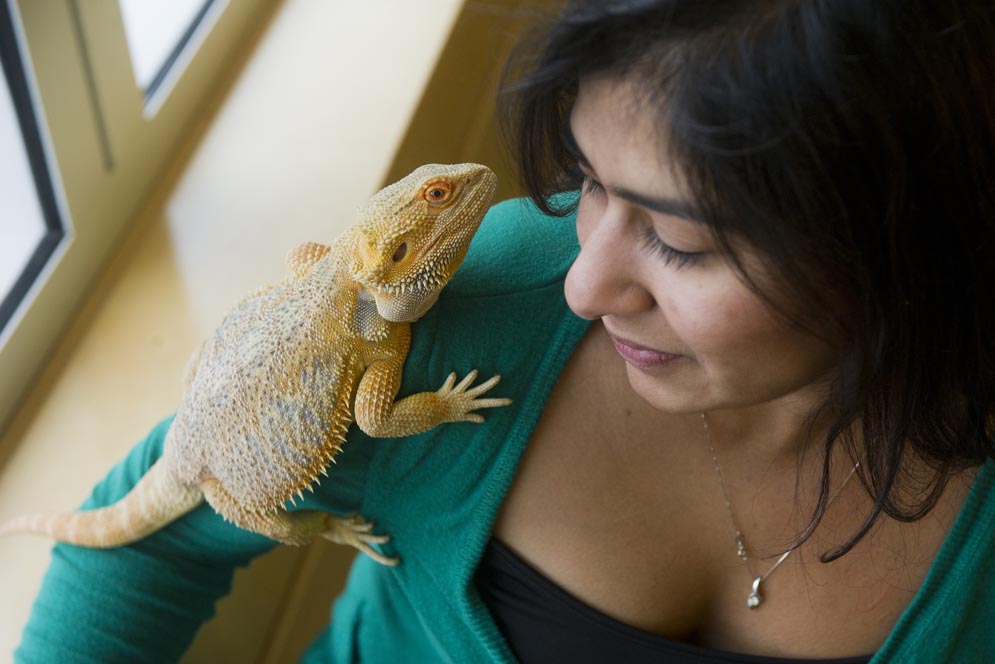
Natasha Khatri (MED’16) was looking on Craigslist for furniture and came across a listing for a bearded dragon. She didn’t buy one then, but it was the beginning of her fascination with the lizards. Khatri finally got her bearded dragon, Ricco, when his former owner could no longer care for him. “He’s special to me because he’s unique, different from other pets, and although he doesn’t have the social interaction skills of dogs or cats, he still has a great personality,” Khatri says.

Margrit Betke, a CAS professor of computer science, and Jon MacGowan (CFA’79) were hiking in the Grand Canyon last October when they came across one of many feral dogs there living off of scraps from hikers and guides. The German shepherd–border collie mix, named Shilah by the guides, approached them for food. Worried the dog might be killed (local authorities cull the population), they helped rescue her and get her out of the canyon. Shilah was adopted by a woman in Flagstaff, who was unable to keep her. When Betke and MacGowan heard, they volunteered to take her, and Shilah arrived at their house in Jamaica Plain just before Thanksgiving. Two days later, she ran away. She was sighted as far away as Boston College, but no one could capture her. A day later, finding her own way home, she showed up on Betke and MacGowan’s doorstep. They say Shilah is adjusting well to city life and hasn’t tried to run away again.

Emily Truax, a public relations associate in the marketing and communications department, has breakfast with her cat Sophie every morning. “I’ve had her since she was seven weeks old, and she’s now two and a half,” Truax says. “I got her through a friend who had a very pregnant stray cat show up at his house one day. Sophie was one of her kittens.” Truax got her right after graduating from college, and says that Sophie is “special to me for a million reasons, but mostly because I feel like we’re growing up together. She’s been with me for so many life transitions. We just get each other. Whenever I’ve had a hard day she seems to know it and shows me extra affection.” Sophie won’t leave the bathroom, she says, if Truax is in the shower and “even sleeps next to me in bed. We do everything together. She’s the closest thing I’ve got to a kid, and I try to give her the best. She loves playing with Q-tips, but not cat toys, has been labeled ‘obese’ by the vet and sheds more than any living thing should.”

Edward B. Feinberg, a School of Medicine professor of ophthalmology, playing here with his 11-year-old standard poodle, Samantha, at his home in Newtonville in December. Samantha lost her right front leg to cancer in fall 2013, but it did little to slow her down. “She has never for one moment stopped to consider her loss,” says Feinberg. “With a grace that most humans can only emulate, she gets up every morning, goes for a walk, chases a tennis ball, chases every rabbit that crosses our yard, and still catches a few.” In a sad postscript, Samantha died in January, likely from a cancer-related intestinal obstruction, shortly after this photo was taken.
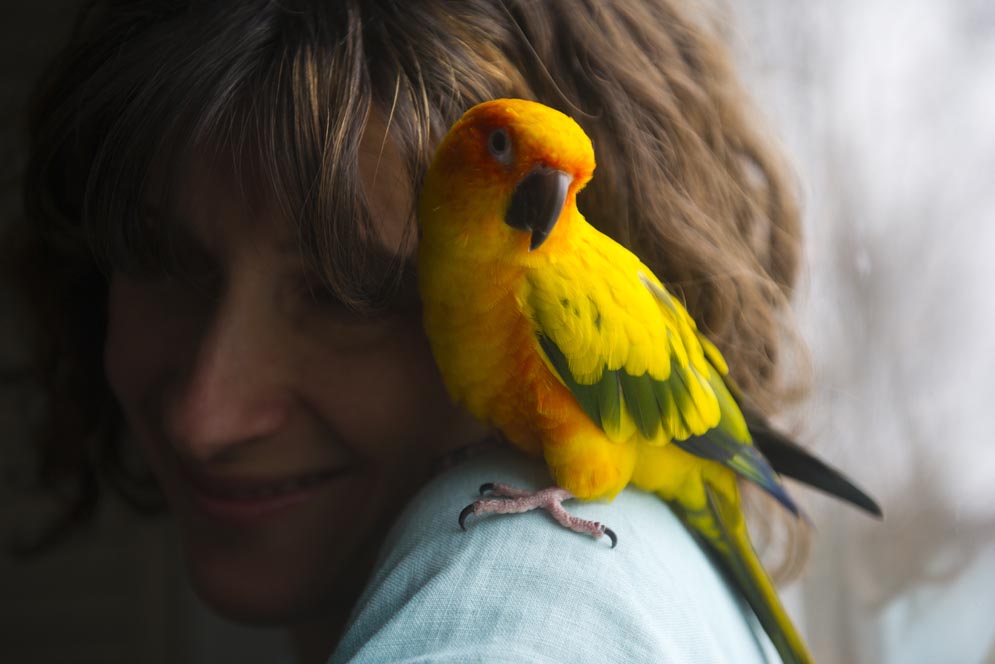
Alya Guseva, a CAS associate professor of sociology, with Persik, whose name is Russian for “peach.” The bird is a three-year-old sun conure, or sun parakeet. “He is extremely affectionate and loves to hang out on our shoulders and take showers in the sink under a faucet,” says Guseva. “Sometimes he screeches very loudly, followed by the phrase ‘Don’t scream’ in Russian. He can say a half dozen words or phrases and can mimic coughing and laughing. He loves when we sing—‘Jingle Bells’ is his favorite. When we sing, he bobs his head to the rhythm of the song and makes a soft squeal with each bob, if you can imagine such a thing. We all love him very much.”
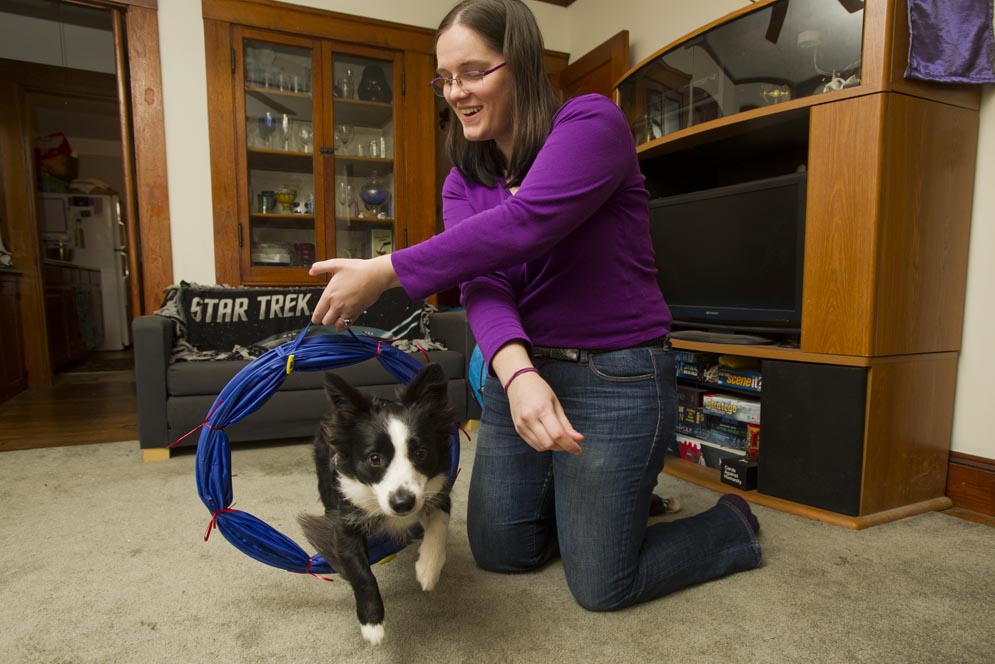
Comments & Discussion
Boston University moderates comments to facilitate an informed, substantive, civil conversation. Abusive, profane, self-promotional, misleading, incoherent or off-topic comments will be rejected. Moderators are staffed during regular business hours (EST) and can only accept comments written in English. Statistics or facts must include a citation or a link to the citation.